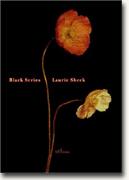Black Series: Poems
Laurie Sheck
book reviews:
· general fiction
· chick lit/romance
· sci-fi/fantasy
· graphic novels
· nonfiction
· audio books
· author interviews
· children's books @
curledupkids.com
· DVD reviews @
curledupdvd.com
newsletter
win books
buy online
links
home
for authors
& publishers
for reviewers

 |
Black Series: Poems Laurie Sheck Knopf Hardcover 112 pages November 2001 |
|
The range of sound properties is remarkable but always tightly controlled. Some long lines have the almost liturgical effect of Whitman: In the distance the red blinking light is the radio tower in Randolphwhile others verge toward the classical deliberation of blank verse: They catch and glitter in her tangled hair.Besides rhythm there is a careful use of repetition, even pauses, to delight the reader with an appreciative ear. Still, more than the sounds, what arrests us about this poetry is the author's special perceptions of familiar landscapes, presented with a verbal intensity that challenges us to participate. Her poems are completely personal, presenting us with a complex, highly integrated, idiosyncratic way of looking. Sheck writes about ordinary things – subway grafitti, mannequins in store windows, horses, insects – in ways that we have not seen them before: On the crest of the far hill, the lone treeor And then the gray concrete of the subway platform, that shoreHere we have a tree and a subway station strikingly, almost surrealistically, transformed. The best of her work in this volume is just like that, vigorous and arresting, revealing a sensibility that we somehow recognize in spite of its strangeness. Her imagery inevitably recalls Samuel Johnson's criticism of the metaphysical poets, whose metaphors, he said, were "yoked together by violence." A generous part of her vision comes from Greek mythology, with allusions to Io, Perseus, Odysseus, and Eurydice, among others, but right alongside these are references to the newest high-tech objects such as Xeroxing, websites and pixels, and e-mail. "Wind," she says in one poem, "You do not click from channel to channel." Yet she seems equally comfortable with both classical and contemporary frames. Occasionally Sheck's usually reliable muse nods when she reaches too hard for the unusual, lasping into sentimentality and almost preciousness. These lapses happen most often when she has objects become sentient: "the anxious dark," "the envious, silver, imprisoned glass," "the night was medicinal. Doctorly, it leaned" "the dark begins to meddle with the buildings," and most notably, "The walls are so tired of their mission to protect." Such tropes may pass for personification or something like it in an English class, but here they mar the credibility of what the author is trying to make us see. What is bafflingly absent in these poems is a sense of human connectedness. They are not addressed to anyone, not even a generic reader (though one is addressed to the wind), and most of them don't include other people, or relationships with them. The poet's feelings seem mainly directed at scenes and objects, which she covers with veils of private meaning but which remain a mostly unpeopled landscape. Even in her most plainly reminiscent poem, "In the South Bronx," the author makes reference to "my father's store," but no father appears as a character. The only person in the poem besides the narrator is a nameless customer on whom she waits. Nevertheless, "In the South Bronx" succeeds remarkably in revealing a strong, recognizable personality: I'd sit among the empty cardboard boxes, each stack of themAnother place where the author reveals her sense of the human relation in in the longest poem in the collection and possibly the best, "Walls," which contains an affecting sketch of a child: One night I heard her crying in her bed, found her with her knees © 2002 by Conrad Geller for Curled Up With a Good Book |
|
|
|
 Click here to learn more about this month's sponsor! |
|
| fiction · sf/f · comic books · nonfiction · audio newsletter · free book contest · buy books online review index · links · · authors & publishers reviewers |
|
| site by ELBO Computing Resources, Inc. | |
 Laurie Sheck's Black Series, her fourth volume of poetry, is encouraging, then, because, although the verse is technically free, there is plenty of rhythm and sound to give us pleasure in the hearing.
Laurie Sheck's Black Series, her fourth volume of poetry, is encouraging, then, because, although the verse is technically free, there is plenty of rhythm and sound to give us pleasure in the hearing.